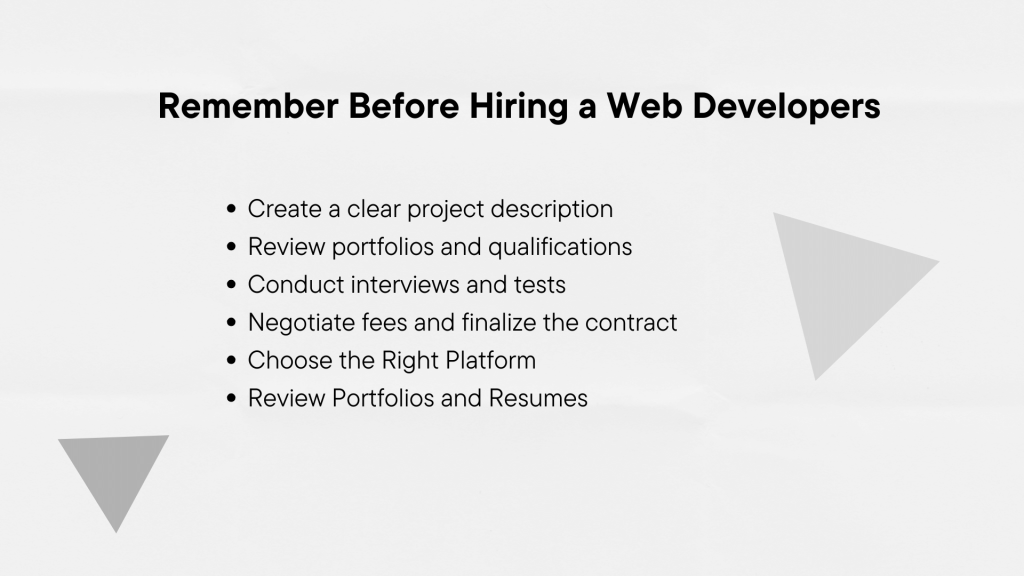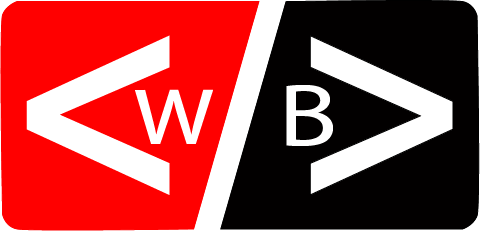Hiring a web developer involves several key steps to ensure you find the right candidate for your project or company. Here’s a step-by-step guide to help you in the process. This process involves identifying the specific skills, qualifications, and characteristics that are essential for the success of your project or team. Here’s a guide on how to define your needs when hiring web developers: Clearly outline the goals and requirements of your project. Identify the skills and expertise required for the web development work. You have to note which purpose you want to hire your web developers. You have to clearly understand the below information.
Create a clear project description:
Crafting a clear project description is pivotal when seeking web developers. This concise yet comprehensive document serves as a guidepost, outlining the project’s goals, technical requirements, and expectations. Begin by succinctly describing the project’s purpose and key objectives. Clearly define the scope of work, specifying the deliverables you anticipate from the web developer. Highlight essential technical skills, experience levels, and any specific focus areas pertinent to the project. Provide insights into the project’s timeline, emphasizing deadlines and milestones. A transparent depiction of the work environment and company culture aids potential candidates in evaluating their fit. Specify the application process, materials required, and contact information. A well-articulated project description not only attracts suitable candidates but also streamlines the hiring process, ensuring alignment between project needs and the expertise of the prospective web developers.
- Outline your website’s purpose and goals.
- Describe your target audience.
- Specify the desired features and functionalities.
- Establish your budget and timeline.
- Include references to any design inspiration or existing websites you like.
Review portfolios and qualifications:
Reviewing portfolios and qualifications is a crucial step in hiring the right web developer for your project. By carefully analyzing portfolios, you can gain valuable insights into a developer’s skills, experience, and design aesthetic. Examining their qualifications allows you to assess their technical expertise and ensure they possess the necessary tools and technologies to build your website. This thorough vetting process helps you identify a developer who aligns with your vision and can deliver a high-quality website that meets your needs and expectations.
- Look for developers with experience building similar websites.
- Check their portfolio for design quality and technical skills.
- Read client testimonials and reviews.
- Make sure their skills and technologies align with your project needs.

Conduct interviews and tests:
Conducting interviews and tests is a pivotal phase in the process of hiring web developers. This interactive stage allows a more in-depth evaluation of candidates’ technical proficiency, problem-solving skills, and overall suitability for the role. Through structured interviews, assess a candidate’s knowledge of relevant programming languages, frameworks, and problem-solving approach. Technical tests, whether coding assessments or project simulations, provide tangible insights into a developer’s hands-on capabilities. It’s an opportunity to gauge how candidates apply their skills in real-world scenarios. Additionally, interpersonal skills, communication, and the ability to collaborate effectively are often assessed during interviews, ensuring a holistic evaluation. This hands-on approach ensures that the selected web developer not only meets the technical requirements of the role but also aligns with the team dynamics and project goals.
- Ask about their experience, skills, and process.
- Discuss your project in detail and answer any questions they may have.
- Give them a test project to assess their technical skills and communication style.
- Evaluate their ability to understand your vision and propose solutions.
Negotiate fees and finalize the contract:
Negotiating fees and finalizing the contract marks the crucial final stages of hiring web developers. It involves candid discussions about compensation, project terms, and expectations to establish a mutually beneficial agreement. During negotiations, consider the candidate’s skills, experience, and the scope of the project. Be transparent about the budget constraints while recognizing the value the developer brings to the team. Clearly define project milestones, timelines, and any additional terms crucial to the collaboration. Open communication ensures both parties are aligned, fostering a positive working relationship. Finalizing the contract involves detailing the agreed-upon terms, ensuring legal compliance, and providing a solid foundation for a successful partnership. A well-negotiated and clearly defined contract sets the stage for a collaborative and productive engagement with the hired web developer.
- Be clear about the scope of work, deliverables, milestones, and payment terms.
- Get everything in writing and signed by both parties.
- Establish communication channels and expectations for project update
Choose the Right Platform:
Selecting the best platform to hire web developers is critical for finding skilled professionals who align with your project needs. Platforms like LinkedIn, Indeed, and Glassdoor offer extensive reach and a diverse pool of candidates, making them suitable for traditional hiring. For a more specialized approach, tech-centric job boards like Stack Overflow Jobs and GitHub Jobs cater specifically to the programming and development community. Freelancing websites such as Upwork and Toptal provide access to a global network of freelance developers, allowing flexibility in project-based engagements. Additionally, platforms like AngelList are valuable for connecting with developers interested in startup opportunities. Ultimately, the best platform depends on your specific hiring needs, whether you’re seeking a full-time employee, a freelancer, or a specialized skill set. Combining multiple platforms may provide the broadest exposure and increase the likelihood of finding the ideal web developer for your project.
Upwork: Upwork is a popular freelance marketplace connecting businesses with a global pool of web developers. It offers a variety of skill sets, allowing you to find developers for short-term projects or ongoing collaborations.
Toptal: Toptal prides itself on providing access to the top 3% of freelance talent. It’s a curated platform where businesses can hire elite web developers for projects of any scale, ensuring high-quality expertise.
Freelancer: Freelancer is a versatile platform where businesses can post projects and connect with web developers worldwide. It allows for competitive bidding, enabling cost-effective hiring for a range of web development needs.
Stack Overflow Jobs: Stack Overflow Jobs is a specialized job board within the Stack Overflow community, making it an ideal platform to find experienced web developers. It focuses on technical roles and attracts a highly skilled developer audience.
LinkedIn: LinkedIn is a professional networking platform where you can find and connect with web developers. Utilize job postings and direct outreach to source candidates based on their skills, experience, and professional background
Review Portfolios and Resumes:
Reviewing portfolios and resumes is a crucial step in the process of hiring web developers. Portfolios offer a visual representation of a candidate’s previous work, showcasing their skills, creativity, and the range of projects they have undertaken. Pay attention to the design, functionality, and overall user experience of the websites or applications featured in the portfolio. Resumes provide a comprehensive overview of a candidate’s educational background, professional experience, and technical skills. Look for relevant qualifications, certifications, and the specific technologies the developer is proficient in. Together, portfolios and resumes offer valuable insights into a candidate’s expertise and suitability for the role, helping you make informed decisions during the hiring process.
In-Person or Virtual Interviews:
In-person or virtual interviews are pivotal stages in the hiring process for web developers. These interactions provide the opportunity to delve deeper into a candidate’s technical capabilities, problem-solving skills, and overall fit within the team. During these interviews, assess a candidate’s proficiency in relevant programming languages, frameworks, and their approach to coding challenges. Virtual interviews facilitated through video conferencing, allow for efficient remote assessments, enabling access to a diverse talent pool. Both formats offer a platform to gauge a candidate’s communication skills, interpersonal dynamics, and adaptability—qualities critical for successful collaboration. Whether face-to-face or virtual, these interviews serve as a crucial juncture for aligning expectations, assessing cultural fit, and ultimately making informed decisions when hiring web developers.
Check References:
Checking references is a vital step in the hiring process for web developers. This phase involves reaching out to a candidate’s previous employers, colleagues, or clients to gain insights into their work ethic, technical skills, and overall performance. By speaking directly with individuals who have worked alongside the candidate, you can validate the information presented in their resume and during interviews. Reference checks provide valuable perspectives on a candidate’s ability to meet deadlines, work within a team, and contribute positively to projects. This thorough examination of a candidate’s professional history ensures that you are making an informed decision, fostering confidence in the selection of a web developer who not only possesses the required technical expertise but also aligns with your team’s expectations and work culture.
Evaluate Soft Skills:
Evaluating soft skills is a crucial aspect of the hiring process for web developers. While technical proficiency is essential, soft skills play a pivotal role in determining a candidate’s overall fit within a team and their ability to collaborate effectively. During the evaluation, consider a candidate’s communication skills, problem-solving approach, adaptability, and teamwork capabilities. Assess their capacity to convey complex technical concepts clearly and understandably, as well as their ability to work seamlessly with other team members. Strong interpersonal skills and a positive attitude contribute significantly to a productive and harmonious work environment. By holistically evaluating both technical expertise and soft skills, you can ensure the selection of a web developer who not only meets the project’s technical requirements but also integrates seamlessly into the collaborative dynamics of your team.
Offer Negotiation:
Once you’ve identified the right candidate, discuss compensation, benefits, and other terms.
Be prepared to negotiate to reach an agreement that is satisfactory for both parties. Develop an onboarding plan to help the new hire integrate smoothly into your team and understand your company’s processes and culture.
Conclusion
Remember, finding the right web developer is not just about technical skills but also about how well they fit into your team and organization. Taking the time to thoroughly assess both technical and soft skills will increase the likelihood of a successful hire. Hiring web developers involves a multifaceted approach that goes beyond technical expertise alone. Successful recruitment requires a clear definition of project needs, a well-crafted job description, and strategic use of platforms for sourcing talent. The process includes rigorous interviews and assessments, where portfolios and resumes offer insights into a candidate’s past work. Evaluating both technical proficiency and soft skills is paramount, ensuring the selected web developer not only possesses the necessary coding skills but also aligns with the team’s dynamics and company culture. Checking references provides a crucial validation of a candidate’s history and performance, contributing to a more informed hiring decision. Finally, negotiating fees and finalizing the contract marks the culmination of the process, setting the stage for a collaborative and successful partnership. In essence, a comprehensive hiring strategy for web developers considers not just the skill set but also the holistic attributes that contribute to a positive and productive working relationship.


